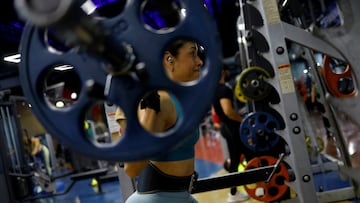These are the 5 best bench press exercises according to your age and gender
The popularity of strength training has seen an upswing in recent years. One of the most popular exercises is bench pressing. Which form is right for you?

According to the most recent data from the US Bureau of Labor Statistics, roughly 18 percent of Americans aged 15 and older from 2011 and 2015 engaged in some sport or exercise activity on a typical day. Just shy of 9 percent did weightlifting but the popularity of strength training has seen an upswing in recent years among both men and women.
Americans’ interest in wanting to build muscle and get more fit skyrocketed with the pandemic. In 2023, the second-most popular fitness trend after wearable fitness technology was strength training with free weights according to an annual worldwide survey in the American College of Sports Medicine’s Health and Fitness Journal. The most popular weightlifting exercise for both sexes is the bench press, also known as the chest press.
“There are probably at least a dozen different varieties of [the] bench press [exercise],” Ryan Horton, Georgia Tech’s director of applied sports science, told Forbes. The “two staple exercises” consist of the barbell bench press and the dumbbell bench press, Horton says, which can be categorized into the flat bench, incline bench and decline bench. These in turn allow for variations of their own that can be used to target certain muscles.
So what is the best bench press for you given your age and gender?
These are the 5 best bench press exercises according to your age and gender
The bench press is recommended for individuals of all ages as a fundamental strength training exercise for helping to improve overall fitness at any age. The good news for those looking to get started with weight training is that neither age nor gender generally affect performing the bench press correctly. One exception age-wise though, is that pre-adolescent youth, both boys and girls, have a distinct disadvantage in strength capacity compared to adults of the same gender.
Those looking to build out their chest would do best to do the flat chest press with a wide grip. Besides working the whole of the chest muscles, this bench press exercise works the muscles in the shoulders and arms. The incline bench press focuses more on the upper chest and the shoulders, while the decline bench press the lower chest and shoulders. There is also the flat bench press with a narrow grip that works the triceps and forearms.
When it comes to barbell versus dumbbell, they both have their pros and cons. The latter allows for more range of motion, bringing the arms closer together at the top of the extension and more stretch of the chest and shoulders in the bottom position. It can also address muscular imbalances between your right and left sides, reducing the possibility of shoulder injuries while weightlifting from the single bar tilting.
The barbell on the other hand, allows you to add more weight, as your strength permits, on the single bar than you could lift of the same amount combined with each arm individually since they are working together as a unit.
In order to avoid injury, it is important to follow the correct motions for each position. It is also very important to have a spotter when performing bench presses and to stop when your muscles begin to burn or you feel fatigue.
At 93, Richard Morgan is as fit as a 40-year-old. His body offers lessons on aging.
— The Washington Post (@washingtonpost) January 22, 2024
The human body maintains the ability to adapt to exercise at any age, showing that it’s never too late to start a fitness program. https://t.co/n5k1iGvdc5
How much weight can you bench press according to your age and gender
There are several factors that determine how much weight a person can bench press, primarily an individual’s fitness level and weight.
Related stories
Those who began training in their youth will have an advantage over those who begin later in life in what Horton refers to as “training age.” Bench press beginners’ bodies “may have to learn new neuromuscular pathways to support the new movement pattern.” Commonly, one can increase the amount of weight they can bench press as their body adjusts to the movement pattens involved and becomes ever more efficient at completing them.
The more a person weighs, their size or body mass, “can help you bench press more weight,” according to Horton. However, those with excess body weight may encounter limitations in muscle performance due to their ability to increase mobility and build strength being hampered.


